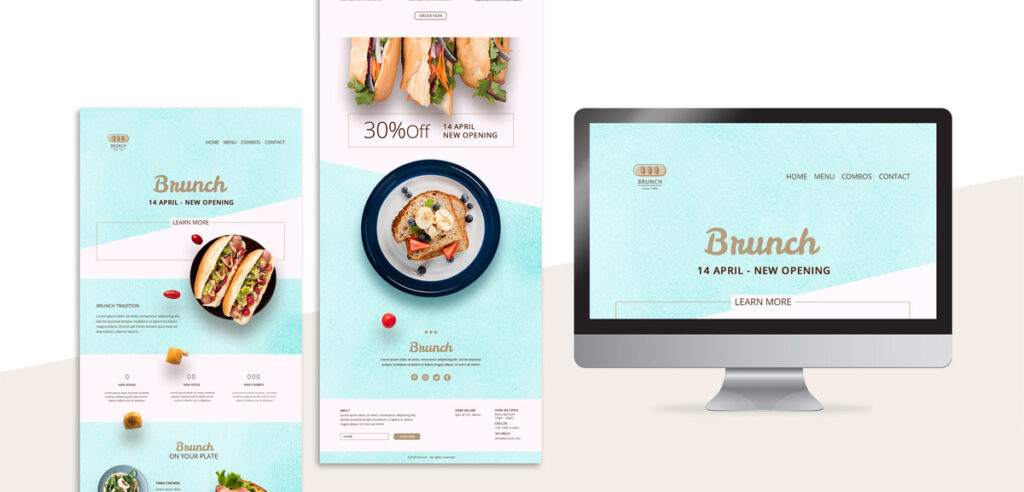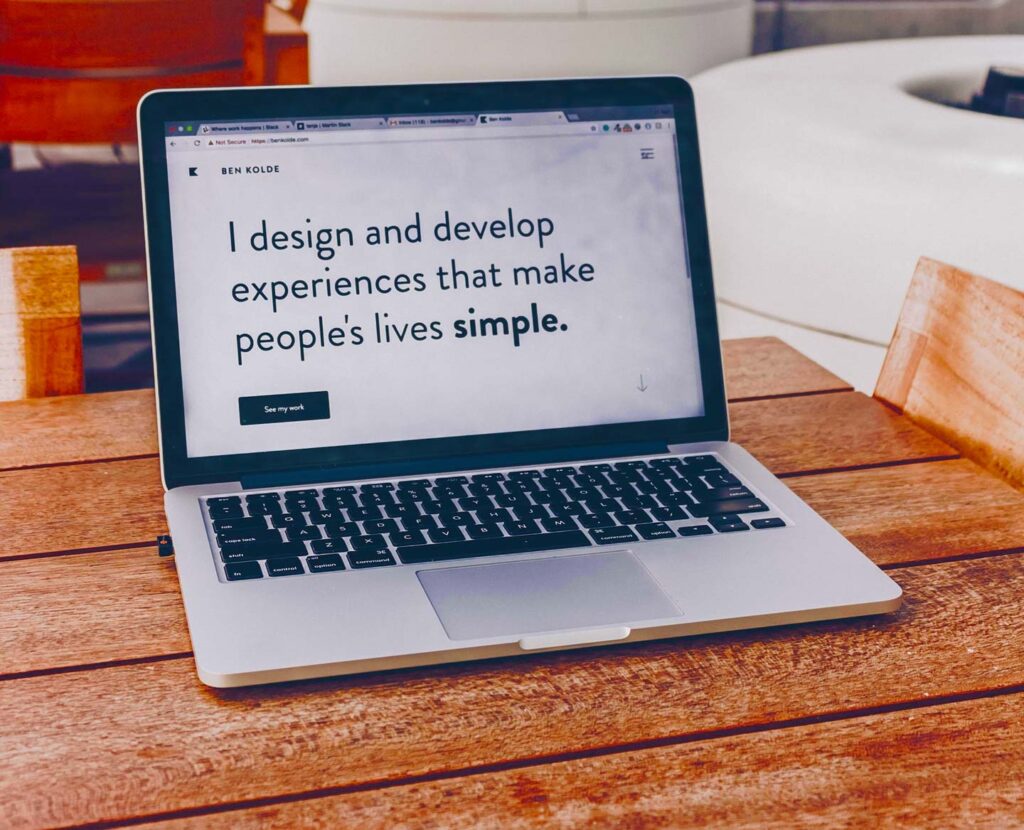Your website is a crucial element in shaping your online visibility for your local business.
Making the right choice when selecting a Long Island web design company can make all the difference, significantly impacting your success online.
In a market as vibrant and competitive as Long Island, where options seem endless, it’s imperative to navigate this decision of choosing the right web design partner with strategic precision. This article is tailored to be your trusted guide in this process, offering 22 indispensable tips to simplify the intricate task of hiring a Long Island web design company. It will equip you with everything you need to know, consider, and ask when consulting with web design companies and digital marketing firms.
Whether you’re a law firm in Garden City, a landscaper in Sayville, or a winery on the North Fork, these invaluable tips are designed to empower any local business. They provide the insights and strategies necessary to choose a web design partner that not only builds and enhances your website but also aligns seamlessly with your unique business goals, setting the stage for sustained, long-term success.
1. Do your due diligence and spend time researching.
Don’t rush into hiring the first web designer you come across on Google. Invest substantial time upfront doing research and due diligence to find the best candidates for your business’s needs.
- Search online business directories.
- Read reviews on Google and Facebook. Look beyond just star ratings to read detailed feedback.
- Ask for referrals from other local businesses you trust.
- Check the various social media groups you are a part of.
Most of all, talk to multiple companies before deciding. Conducting comprehensive upfront research instead of going with the first option prevents regrets down the road. The extra diligence will pay dividends by finding a truly ideal partner
2. Determine your wants and needs.
First and foremost define your style and design preferences. Provide the web design company with examples of aesthetics and tone that appeal to your business. This can be elements like colors, fonts, graphics, and photography. If your business already has a set branding style, share that with the web designer so they can adhere to your vibe.
Next, align on technical needs by discussing essential technical requirements for your website.
- What features do you want? Ecommerce? Lead gen forms?
- How many pages will the site have?
- What type of content will you feature?
- Do you require any custom features or special functionality?
3. Identify your website goals and set clear objectives.
Beyond just “needing a website”, think through and clearly define the tangible business goals and problems your website should solve. What is your ultimate goal and vision?
- Do you want to generate more leads?
- Increase online sales?
- Improve awareness of your business on Long Island?
- Are you looking for your business to rank well on Google?
Defining clear objectives and success metrics (lead form submissions, time on site, etc.) informs strategies and keeps your project on track.
Bottom line: Be firm about what you are looking to achieve and convey that to the web company.
4. Have a clear idea about your budget.
Before even contacting any web designers or meeting with a web development company, you should know how much you can realistically invest in your website. Web design companies on Long Island offer a wide range of pricing. There is no standard pricing model that all web design companies follow. The cost of the same project can be dramatically quite different from one agency to the next.
So the best thing to do is to have a budget in mind and be upfront about it. This will allow you to target web design companies that fit your range and avoid wasting time. Make sure to also factor in potential ongoing costs too like hosting, domain name registration, and maintenance.
5. Hire user experience (UX) expertise over design skills.
While good visual design is important, choose a web designer who has user experience (UX) expertise over impressive design skills. Building websites is not as much about making them look polished and eye-catching as it is about creating a seamless experience for users who visit your website. Ideally, any web designer you choose to work with whether a freelancer or web design company should have the following specialized skills:
- Intuitive information architecture and site mapping
- Seamless, consistent navigation and menus
- Thoughtful content creation, formatting, and placement
- Conversion optimization through landing pages, sales funnels, calls-to-action etc.
- Making user interfaces like forms and checkouts as frictionless as possible
- Following best practices for ranking on search engines
- Designing mobile-friendly responsive experiences
Remember, superior UX drives results and ROI, over visual flair.

6. Focus on specialists and business partners, not hired guns.
Taking the last point a step further, rather than hiring generalist designers, seek specialists who focus on businesses like yours. Someone experienced in building sites in your specific industry will understand the business challenges and your target audience better. A web design company with ecommerce expertise can maximize conversions for an online store. A company with experience building websites for financial planners or attorneys will have the wherewithal to craft a user experience that conveys trust and credibility.
Additionally, you want to look for strategic partners invested in the success of your business, not one-off hired guns who are just being paid to complete a job.
Ultimately, you want to work with someone who is a business partner and cares about your business — someone driven to understand your goals and needs in order to craft the optimal website.
7. Go with someone who understands the local Long Island market.
The ideal web development company will have worked with other Long Island businesses and understand the local ecosystem intimately. For example, they’ll know which marketing channels and outreach work best to connect with customers in the area. They’ll understand the pulse of local communities like the Hamptons vs. Bay Shore and what resonates with each.
An expert Long Island web designer, who is tapped into the local Long Island market can help you stand out from the crowd by showcasing the aspects that make your local business unique and interesting. They know how to optimize websites so they are found by ideal local customers searching for businesses like yours. This deep familiarity with marketing effectively on Long Island itself is an asset.
Plus, hiring a local company offers advantages like in-person meetings and shared regional knowledge. Proximity can streamline your collaboration and allow the process to run much smoother.
8. Vet their capabilities and experience.
In addition for specifically looking for a web company with UX expertise as detailed in point five, you want to take the time to thoroughly vet each agency’s capabilities and experience. Because here’s the truth about web design and development companies, especially the smaller ones, some are very skilled technically but lack professional design skills, while others are visually talented but take shortcuts with technical development.
Your job is to understand their expertise and ability to deliver on your vision to see if they are a good match for you and your business.
Start by reviewing their entire portfolio and case studies (see next two points) to evaluate the types of websites they have built and the skills demonstrated. But also don’t be afraid to ask them direct questions like:
- How many years of experience do you have building websites for small businesses?
- What is your strongest attribute as a web design and development company?
- Why do you think you are the right company or person for the job?
9. Ask to see work from previous local clients.
The keyword here is local — we already touched on this idea focusing on local web design companies, but it’s worth calling it out again. When reviewing a company’s portfolio, ask to see work samples specifically from other Long Island small businesses. This gives the best indication of their ability to create sites that resonate with the Long Island market and drive results for small businesses like service providers and brick-and-mortars. Creating a website for a new high-end seafood restaurant is much different than creating a website SAAS startup.
When going through their portfolio, examine it closely to evaluate their skills and past work.
- Look for samples relevant to your industry and business aesthetic.
- Look for clean, professional designs appropriate for your target audience.
- Browse live site examples to test functionality on desktop and mobile.
And be sure to follow up with their Long Island clients for references and testimonials, which leads to our next tip.
10. Check client testimonials and references.
Speaking directly to a web design company’s past clients provides candid insight into their work and customer service.
Rather than relying just on testimonials listed on their website:
- Ask for contact information for 5 recent clients that you can reach out to directly.
- Google their business name + “reviews” to read any reviews of their business on Google, Facebook or any other platform
When reaching out to their past clients: Get feedback on their communication, timeliness, handling of issues, and overall services. Verify they delivered successful outcomes. References are invaluable. So if a company tells you they can’t provide you with the contact information of any of their past clients take that as a red flag.
11. Seek conversion optimization and SEO skills.
A good web design and development company is more than just creating mockups and writing code. You want to work with a company that has the visual and technical chops but also are marketers. Truth be told, the best web design companies on Long Island are the ones that have a high acumen for digital marketing. They possess high proficiency in conversion rate optimization (CRO) and are experts in search engine optimization (SEO). These skills have a major impact on whether your website gets traffic and converts visitors into leads.
Ask for case studies that showcase the skills or ask them directly: How has your company increased conversions and organic traffic for past clients?
Consider these skills:
- Targeted and Optimized landing pages
- Strategic calls-to-action
- Optimized sales funnels and checkout flows
- Email marketing and lead capture
- Improved page speed and mobile optimization
- Content that appeals to both users and search engines
- Clean semantic code and website structure
Ideally, you want them to quantify the growth and value they generated from helping other businesses with their website. Remember, results matter more than promises.
12. Examine their own website.
You can learn a lot about a web design and development company by examining their own website. First and foremost, this will give you a good sense of their own design prowess. If their website looks unpolished or doesn’t delight you, do you really want to entrust them with your website?
Additionally, you also want to take note of the functionality of their website. How is the mobile experience? Is the navigation intuitive? How are calls-to-action used? Are there client case studies? Is the copywriting strong? Is the site optimized for conversions and SEO?
A web design agency’s own website demonstrates its abilities clearly. Scrutinize it closely.

See How I Can Help Build Your Long Island Business A Website That Wows Customers.
- Custom Web Design: 100% bespoke design matching the personality of your local business & tailored toward your goals.
- SEO – unlock more SEO traffic. See real results.
- eCommerce – Websites that drive sales, offer ease of management, and are scalable when you are ready to grow.
13. Ask the right questions.
Tony Robbins has often said: “The quality of your life is a direct reflection of the quality of the questions you are asking.”
So, if you want to work with a quality web design company, you have to make sure you are asking the right questions when vetting them. Come prepared to ask the following:
- Ask about their entire process from concept to taking your site live. Review the specific design, development, QA, and launch process they follow. Organized processes yield better results.
- How do they collaborate with clients? How many revisions or options do they provide?
- Inquire about post-launch support and maintenance options. Is continued optimization included?
- Understand their business model. Are they a freelancer, a web design company, or a full-service digital agency that offers various other digital marketing services? The provider type impacts relationships.
- Discuss timelines and capacity. How does project scheduling work? How many other concurrent clients do they handle?
Asking the right question ensures you choose the right partner for your business. (For questions to ask regarding pricing, see number 20 on this list.)
14. Prompt them for recommendations and suggestions about your business.
Speaking of insightful questions, a quality web design company will ask good questions too. They should ask about your business’s goals, audience, and challenges. But even more importantly, they should provide ideas on how your website could be structured and designed to best meet those needs.
If you already have a website and you are looking to redesign or upgrade, they should come to the meeting with recommendations and ideas on how you can improve not only your website but your digital marketing in general. If they don’t provide this to you when you meet with them, this might be a red flag. Any quality agency will be eager to give you a few “easy wins” that you can integrate into your website right now, especially if your website is in bad shape.
Ultimately, you want to work with a designer who brings ideas to the table rather than waiting for your lead. This demonstrates their commitment and passion for not only the work they do but for your success.
15. Always request website mockups.
Never start a web design project without the agency agreeing to go through a design phase, where they will provide you with mockups of how the site will look. Mockups bring initial concepts and layouts to life so you can visualize the site before they build it. Ideally, most web design firms will provide at least 2-3 mockup options for you to review and get your feedback on.
Mockups allow you to preview page layout, user flow between pages, general aesthetics, content placement, and functionality before any heavy lifting occurs. You can identify improvements early and keep alignment tight. Don’t leave the visuals solely up to imagination — mockups add invaluable clarity.

16. Take note of their communication skills
While you are going through the vetting process of finding a web design company, pay close attention to how well a potential company communicates with you initially. Do they listen attentively and respond clearly to your questions and concerns? Can they explain technical concepts simply? Are they proactive or do they wait for you to drive discussions?
Since you will be collaborating closely throughout the website design process, excellent communication skills are non-negotiable. I’ve seen it happen too many times in my early days as a freelance web designer, a lack of clarity from miscommunication leads to a misalignment between designer and client, which creates unnecessary delays and additional work.
It’s it’s better to work with someone who over-communicates, provides frequent status updates, and is responsive when you have questions. But ultimately, you want to make sure their communication style aligns with yours.
17. Avoid letting them use technical jargon.
Speaking of communication, beware of web development companies who frequently use complex technical jargon without explaining concepts simply. Experienced website professionals can communicate the intricacies of the project in a way that is down-to-earth and you understand, especially if you are not technically inclined. Ideally, they should be able to assess your technical knowledge and adapt conversations appropriately. If discussions become filled with unfamiliar acronyms and tech speak, halt them, and ask them to clarify in more detail.
Always make sure complex aspects are demystified.
Some web development firms inadvertently take advantage of a customer’s lack of technical understanding. Remember, their job is to clearly explain the work they are doing, so to be afraid to press them to explain. If they do and you still are unsure about some things, or if something sounds fishy, then just contact me. My team offers a complimentary web consultation for all Long Island local businesses where you can pick our brains on anything.
18. Be wary of bold guarantees.
Grand promises like “we guarantee you’ll be #1 on Google” or “we’ll double your sales” should raise skepticism. Genuine web design companies speak more to processes than guarantees.
While goals should absolutely be ambitious, be wary of absurd claims, hard sells, or pressure tactics. No website company can guarantee first page Google rankings or exact sales numbers — too many factors are involved.
Probe behind big promises — what specific strategies will they implement to attempt these goals?
High-quality web companies will have case studies proving results, not mere claims. Seek realistic expectations for your project and alignment on success metrics. Define success metrics together. The focus should be on a long-term partnership, not hard sells.
19. Determine what happens post-launch.
As mentioned in the “Ask The Right Questions” section, when interviewing web design companies, ensure you discuss ongoing support and maintenance after launch.
- Will they monitor hosting performance and uptime?
- Is ongoing website optimization and updates included?
- Are there retainers available for regular site updates and new content?
- What is the process for making changes post-launch?
- How can you get quick help with issues that arise?
Ideally, the web company will have a plan and process to keep your site optimized over time. Seek to define this upfront so there are no surprises. Great websites require nurturing after going live. Consider the level of support you will need after the site goes live and get a sense of what their availability will be like to help you.
20. Get clear on pricing and terms.
When comparing web designers, get crystal clear specifics on project pricing, payment terms, billing schedules, and what is included.
- Is it flat pricing or hourly?
- If it is flat pricing, what is included and what is not?
- What falls outside of the project scope and will incur additional charges? Have them be explicit about that.
- What about design iterations? If a designer proposes a design and you don’t like it, what happens? Are design changes unlimited or capped at a certain amount?
- How are payments structured? Deposit/milestones or installment billing?
- Are code backups and documentation provided?
- What are the policies if either party terminates?
Don’t overlook the fine print. Look for clarity on project scope, payment terms, copyright, and protections in case the project goes off the rails. Leave no ambiguity.
21. Ensure adequate availability.
Ask the web company about their current workload and bandwidth. Do they already have a large number of ongoing client projects and commitments?
Multitasking too many clients can negatively impact project timelines and quality of service. Seek realistic schedules, not just the quickest turnaround. The project proposal should outline specific project milestones and dates for deliverables.Make sure timeframes work for your launch goals.
Also, if you are making a big investment on a large project with a web firm, ideally, you want a partner focused on delivering excellence for the relatively few clients they work with. Split focus can be problematic.
22. Don’t hire just based on price.
The temptation can be strong to choose the web design company offering the lowest rate or quote. But be wary of rates that seem too good to be true. As the old adage goes, “You get what you pay for” — and it often rings true. Incredibly cheap deals may signal inexperience or poor quality work.
Rather than bargain hunting, seek fair value aligned with results. Review portfolio quality and proven outcomes.
Conversely, don’t immediately dismiss companies or freelancers that are more expensive — the ROI may justify the price. Someone who charges higher rates but delivers substantial growth has genuine value.
Trust your instincts.
Hiring a web design company for your small business on Long Island is no small decision. However, taking the time to thoroughly evaluate each company, asking the right questions, and clarifying how they can benefit your business from the start will set your website project up for success.
If anything raises even slight hesitation during the vetting and discussion process, trust your instincts. It’s better to keep looking than ignore red flags now that could turn into bigger issues down the road.
The ideal web design company on Long Island will stand out through expertise, clear communication, and authentic passion for helping local businesses like yours achieve their digital marketing goals. They will embrace collaboration while providing strategy and vision to push your website to the next level.
So trust yourself to recognize the right fit when you see it. The web designer-client relationship is a partnership through and through, one that requires mutual trust and comfortability in working with one another. Don’t make this decision lightly, it’s a decision your business will reap the benefits for years to come.
Frequently Asked Questions on Choosing A Web Design Company
How do I know if my web designer is good?
Assess the quality of your web designer by examining their portfolio, evaluating the functionality and design of their own website, checking communication skills, seeking client references, and ensuring they demonstrate a commitment to understanding and improving your business.
What to look for when hiring a web design company?
When hiring a web design company, look for UX expertise, check their understanding of the local market, ask about their process, inquire about post-launch support, and seek clarity on pricing, terms, and project scope.
How can I find the best Long Island web design company for my business?
Conduct thorough research by checking online directories, reading reviews on platforms like Google and Facebook, seeking referrals from local businesses, and exploring social media groups. Talk to multiple companies before making a decision.
What should I consider regarding my budget when hiring a Long Island web design company?
Determine a realistic budget before contacting web designers and developers. Factor in potential ongoing costs like hosting and maintenance. Be upfront about your budget to target companies that fit your range.
What should I discuss with a web design company regarding my website’s design preferences?
Clearly define your style preferences, providing examples of aesthetics, colors, fonts, and tone. Discuss technical needs such as features, number of pages, content type, and any custom requirements.



